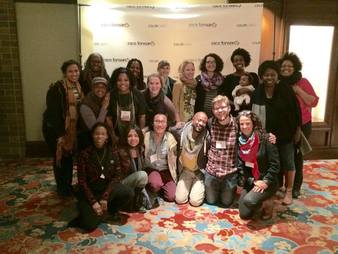 Our incredible team of Dance Exchange artists, collaborators, and partners. Our incredible team of Dance Exchange artists, collaborators, and partners. It’s important to note that the 2014 Facing Race conferences was the largest one by far and was the first one to be held in the South. Day Two offered just as many wonderful choices if not more! The opening plenary examined the powerful impact of southern organizing and the closing key note call to actions from three outstanding speakers. My break sessions explored racial equity in the education system and the representation of race in the media. What follows are my notes from each session: Roots and Wings: Southern Histories, Legacies and Innovations for the Future Description: When some outside the region think of the US South, often the imagination leads to images of slavery, struggle and protest that starts in the 1800s and stops in the 1960s. For the many of us- people of color, immigrants communities, LGBTQ people – who populate and call this region home, we experience and understand “the South” as not only the place where race, power, and revolution is best understood but also where history and legacies give way to 21st century innovation for our movements. Click here to learn more about the session and speakers. Having been raised in Texas and in the process of moving to North Carolina, I was particularly interested in this conversation. Here are my notes:
Transformative Approaches for Addressing Race, Healing and Taking Action for Equity in Schools Description: This interactive session will explore key racial equity concepts and strategies that support an educator’s ability to identify, interrupt and address inequity in their classrooms and schools. Educators will walk away with a deeper understanding and practical tools for engaging in sense-making conversations about racial equity that lead to productive action. Click here to learn more about the session and speakers. Goals for the Session:
Leading for Racial Equity Requires:
Listening: Your Best Leadership Tool Any kind of transformation begins with how you listen and what kind of discourse that you’re in. Constructivist Listening allows for such transformation. Guidelines
Talking about Race and Racism in schools provides students, educators, and families with an understanding, awareness, and vision of Racial Equity and Justice. We have to remember that school systems are based in hegemonic patriarchal structures. We have to ask ourselves:
We must remember that when racial inequity is present, we much change the discourse. We moved from (Discourse 1) dominant ways of seeing and engaging the work of education that maintain existing practices and serve to reproduce social inequity. From here, we move to (Discourse 2) new ways of seeing and engaging the work that challenge the status quo by naming uncomfortable realities and unequal conditions while pushing for the deep inquiry. We want to apply tools constructively listen to shift the discourse and create spaces for learning and change. Remember, it’s not enough to stop the bias. We must create a space for something different. This was by far, the most useful session of the entire conference. Olivia Pope Notwithstanding: Strategies to Transform a TV Landscape Causing Everyday Harm to Black People Description: Stereotypical images of Black people are not only insulting and inaccurate — they’re dangerous. Research shows that the limited stories we see shape cultural attitudes about Black people and drive the decisions of lawmakers, employers, teachers and police. Media literacy training has taught us all to understand the problem, but what are the strategies for creating real change? Click here to learn more about the session and speakers. While most directly related to the work I do as a playwright, this session left me and others quite frustrated. Unfortunately, we didn’t discuss action plans or next steps, but here are some poignant thoughts and reflections:
The Next Fifty Description: This year and next we will celebrate the anniversaries of major racial justice victories like the Civil Rights and Voting Rights Acts. In this plenary, big thinkers will reflect on trends and strategies for the next half century. Get your long term on with Ian Haney Lopez, Van Jones, and Rinku Sen. Click here to learn more about the session and the speakers. Ian Haney Lopez spoke to the 2042 demographic shift, the evolution of racism, and the boundaries of whiteness:
Van Jones challenged leaders of color to expand our presence and expertise in the four centers of power: Washington DC, Wall Street, Silicon Valley, and Hollywood.
Rinku Sen delivered another rousing address that marked the next 50 years of our work together and how we have to see ourselves as one constituency.
With that, this amazing conference came to an end. I left feeling exhausted, but armed with resources, methodologies, and passionate allies. I felt a shift occur in my thinking, in how I want to spend my time, effort, and energy. I’m not the same person from all that I’ve experienced over the past four days and I’m grateful for it. I’m excited to take this knowledge and new sense of self back my work in the American Theatre and to my new home in North Carolina.
0 Comments
Your comment will be posted after it is approved.
Leave a Reply. |
My BlogI'm a playwright, dramaturg, and teaching artist. It is here where you'll find my queries and musings on life, theater and the world. My posts advocate for diversity, inclusion, and equity in the American Theatre and updates on my own work. Please enjoy!
Categories
All
Archives
June 2020
Reading List
|
